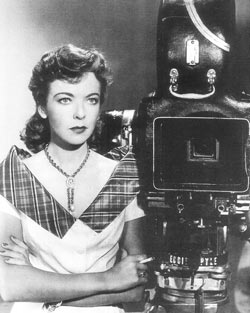
Of course, a list of her credits only tells part of the story. The nature of the moviemaking beast in those days was a nonstop schedule of production, after all.
What sets Lupino apart is the impact she had on the noir ethos, especially in the 1950s.
Born in England to a theatrical family in 1918, Lupino got her start when she accompanied her mother to an audition for the 1933 film Her First Affair. Director Allan Dwan saw something special in the preternaturally-mature teenager and cast her instead of her mother (which must have made for a tense discussion at dinnertime). The role called for Lupino to play a seductress, “where upon,” she later recalled “at the tender age of thirteen I set upon the path of playing nothing but hookers.” Although pretty and leggy, Lupino already exuded a seen-it-all weariness with the world. Soon, she was a star at Warner Brothers, but she felt trapped there as a “poor man’s Bette Davis.” She wanted to do more than play the roles Davis turned down.
By 1940, although she was only twenty-two, Lupino already seemed an ideal fit for the emerging genre of film noir. She had been perfect as tough-minded dames in pictures like They Drive By Night and High Sierra, opposite Humphrey Bogart, who was himself getting ready to jump into noir with both feet. (Alas, Lupino and Bogart did not get along, and she refused to work with him on subsequent pictures.) While she made comedies and dramas, she seemed to keep at least one foot in crime pictures. She appeared opposite John Garfield in Out Of The Fog, and Jean Gabin in Moontide. In 1947, she starred in The Man I Love, a noir melodrama with more plotlines than any one human could hope to follow. Lupino was excellent in it, playing the first of several hard-living lounge singers. Lupino so excelled at these roles that writer Vince Keenan, in the journal Noir City, credits her with establishing “the chanteuse as a self-reliant figure leading life on her own terms.”
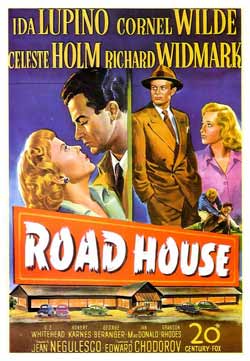 The following year, she issued her ultimate noir performance as the boozy torch singer Lily Stevens in Jean Negulesco’s masterpiece Road House. Placed between stolid Cornel Wilde and psycho Richard Widmark, Lupino anchors the film with a performance that’s equally sexy and tough. She’s still beautiful (and she can wear a swimsuit as well as anyone) but she looks decidedly older than her actual age of thirty. Her voice sounds like it’s been strip-mined by years of cigarettes and booze, but she’s so charismatic, she sells the songs with the sheer force of her personality.
The following year, she issued her ultimate noir performance as the boozy torch singer Lily Stevens in Jean Negulesco’s masterpiece Road House. Placed between stolid Cornel Wilde and psycho Richard Widmark, Lupino anchors the film with a performance that’s equally sexy and tough. She’s still beautiful (and she can wear a swimsuit as well as anyone) but she looks decidedly older than her actual age of thirty. Her voice sounds like it’s been strip-mined by years of cigarettes and booze, but she’s so charismatic, she sells the songs with the sheer force of her personality.
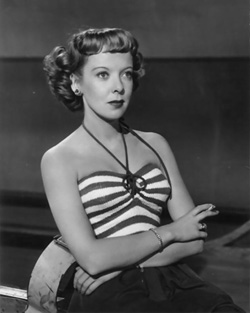
Although she continued to develop that character as a performer in other films, she had grown bored on sets. She wanted a larger piece of the creative process. In 1948, she and husband Collier Young formed a production company which would eventually be called The Filmmakers. The company produced twelve films over the next five years, half of which Lupino directed herself. She filmed hard-edged dramas about a host of controversial subjects: teen pregnancy (Not Wanted), rape (Outrage), and bigamy (The Bigamist). Her most lasting accomplishment behind the camera, though, was the tense 1953 noir The Hitch-Hiker. The story of two men who pick up a psychotic hitchhiker, this film is one of the most brutal flicks in the noir catalog. It’s also one of the most existential: three men and a gun in a car. There’s your plot.
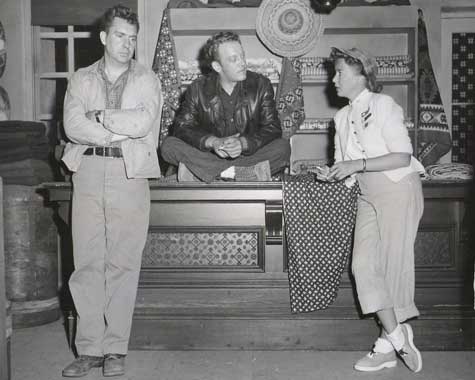
Of course, Lupino is also a notable figure because she was one of the first women in Hollywood to exert creative control. She was only the second woman to join the Director’s Guild of America (after Dorothy Azner), and she followed her movie career with a long stint in television, directing episodes of Alfred Hitchcock Presents, Have Gun-Will Travel, The Rifleman, and The Twilight Zone. In addition to directing, she helped form the production company Four Star Productions which would give the world Zane Grey Theater, The Rifleman, The Big Valley, and Wanted: Dead Or Alive.
Despite all these accomplishments, however, her greatest artistic contribution was to the growth of film noir in the fifties. As a star, producer, and director she helped push American film toward its dark side, and in doing so, she helped keep it honest.
ESSENTIAL LUPINO:
1. ROAD HOUSE (1948)-Ida at her best, beautiful and rough around the edges. Do not miss this one.
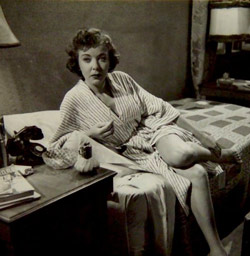
3. THE HITCH-HIKER (1953)-Two guys on a fishing trip stop to give a third man a ride. He turns out to be batshit nuts. Trouble ensues. Ida directing an almost all-male cast in a story about the evil men do to one another.
4. BEWARE MY LOVELY (1952)-Grieving widow Ida is terrorized by psycho Robert Ryan. Creepy stuff.
5. ON DANGEROUS GROUND (1952)-Blind angel Ida meets emotionally-troubled cop Robert Ryan. Can she save him from himself?
6. WOMEN’S PRISION (1955)-Ida turns in her scariest performance as the evil warden of a correctional facility for bad, bad girls. Campy, but you can’t take your eyes off Ida, who establishes the she’s-so-repressed-she’s-sexy lesbian archetype for all the women-in-prison exploitation pictures that would follow.
Jake Hinkson, The Night Editor

Terrific post about a terrific actress and director. Lupino was that rare actress who gave more to a film than just a glamorous profile (“Her voice sounds like it’s been strip-mined by years of cigarettes and booze”–a perfect description!). Her performances in Road House, The Hard Way, Beware My Lovely, and The Man I Love will knock you out of the theater (or living room, depending where you watching). I would also mention her excellent performance in Lust For Gold, an atypical Western she made w/Glenn Ford, which could be called a noir Western–a very dark film about such noir themes as obsession and betrayal. And if you like Ida in Road House, you’ll also find her amazingly sexy in Fritz Lang’s While the City Sleeps!
Great suggestions! She is excellent in While the City Sleeps. I haven’t seen Lust for Gold, but Ford and Lupino in a noir Western sounds like a recipe for a great night of viewing.
Very well stated article. One point of contention comes from Ms. Lupino’s own comments about her affection for Humphrey Bogart (and regrets for not working more with Bogie).
Cheers 🍻